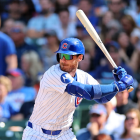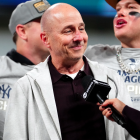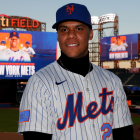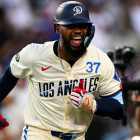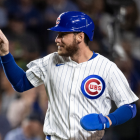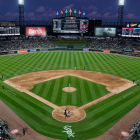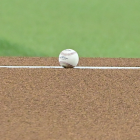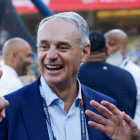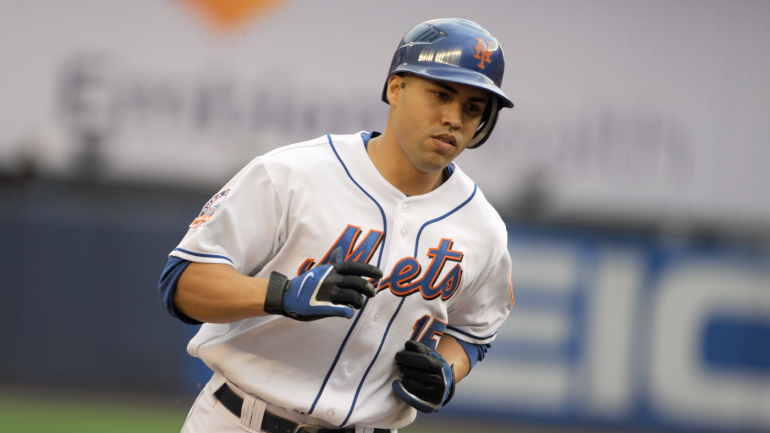
As we continue to examine the 2025 Hall of Fame ballot, let's take a look at the holdover outfielders. We'll separate out Manny Ramirez for a discussion alongside Alex Rodriguez, so that leaves Andruw Jones, Carlos Beltrán, Bobby Abreu and Torii Hunter. Let's discuss the candidacy and chances of induction for that foursome here today.
Andruw Jones
The progression of Jones' vote percentages is fascinating. He was basically a non-factor for two years and then took off, gaining huge ground to the point where it's realistic to believe he's getting in sometime soon.
- 2018: 7.3%
- 2019: 7.5%
- 2020: 19.4%
- 2021: 33.9%
- 2022: 41.4%
- 2023: 58.1%
- 2024: 61.6%
That leaves up to three cycles left to get to 75%. The ballot isn't overly crowded and next season's first-year class isn't shaping up as a very strong one. This is to say there's plenty of room for Jones to keep picking up votes.
As for Jones' case, it's a decent one. There's an argument to be made that he's the single greatest defensive outfielder in history (I've explored it at length before) while he also hit 434 career home runs and drove home 1,289.
Thanks in large part of his all-time great defensive prowess, Jones sits 14th all-time in WAR among center fielders. The JAWS system balances emphasis between career accumulations and high-upside prime performance. Jones fares better in the latter category -- remember, he fell off badly in the second half of his career -- sitting 11th. He's ahead of Hall of Famers like Richie Ashburn, Andre Dawson, Billy Hamilton (no, not that one) and Kirby Puckett. He is still below the average Hall of Fame center fielder, however, and if someone wanted to play it strict on that front, a non-vote for Jones is justified.
As referenced above, the Jones decline was pretty steep. Through his age-29 season, Jones was hitting .267/.345/.505 (116 OPS+) with an average of 5.3 WAR per season. After that, he hit .214/.314/.420 (92 OPS+) with an average of 0.8 WAR per season. Perhaps the recent memory of his abrupt falling apart is what hurt him in the early years on the ballot and the further we get away from it, the more people look back at his prime.
Whatever the reason, Jones is trending toward induction after barely staying on the ballot his first two tries.
Carlos Beltrán
Beltrán's on-field case seems a pretty easy "yes" to me.
In parts of 20 seasons, he amassed 2,725 hits, 565 doubles, 435 home runs, 1,587 RBI, 1,582 runs and 312 stolen bases with a slash line of .279/.350/.486 (119 OPS+). He was a Rookie of the Year, nine-time All-Star, three-time Gold Glover, two-time Silver Slugger and a Roberto Clemente Award winner. He got MVP votes seven times, topping out at fourth place, and won a World Series ring. In 65 career playoff games, Beltrán hit .307/.412/.609 with 15 doubles, a triple, 16 homers, 42 RBI, 45 runs and 11 steals in 11 tries. He's legitimately one of the best playoff performers ever.
Among center fielders, he ranks eighth in career WAR, trailing Willie Mays, Ty Cobb, Tris Speaker, Mickey Mantle, Mike Trout, Ken Griffey Jr. and Joe DiMaggio. That's no great crime. He's ahead of the likes of Duke Snider, Asburn, Dawson, Puckett, etc.
Again, it feels easy.
So why did he only get 46.5% of the vote in his first year and 57.1% last year?
Well, it seems like his involvement with the 2017 Astros sign-stealing scandal is the issue at hand.
I've done a much more thorough breakdown of Beltrán's Hall of Fame case before and it includes a section on the scandal, including Beltrán basically being called "The Godfather" of Houston's sign-stealing operation. The ballot has instructions to consider "integrity, sportsmanship" and "character" as a player.
The best bet here is Beltrán would already be in the Hall of Fame if not for the connection here. He still might make it, but there's also the chance he plateaus before getting to the 75% threshold. It'll be interesting to see how much he gains this year. Again, he started at 46.5% and rose 10.6 percentage points in his second try. If he adds 10 points again this year, he'll be easily within striking range for next. If he stagnates, it's a problem for his hopes of ever getting in.
Bobby Abreu
Abreu has become a bit of a darling for a segment of baseball fandom that embraces certain metrics, but his stagnation last season isn't a good sign that there's enough momentum. Here's how it has gone in his first five ballots.
- 2020: 5.5%
- 2021: 8.7%
- 2022: 8.6%
- 2023: 15.4%
- 2024: 14.8%
He did sit in a similar spot in years two and three before a leap, so maybe there's another leap in there this time around? It still can't be very encouraging for the Abreu fans out there. I'd say for there to be any hope at all he's got to get over 20% and maybe even 25% or 30%.
In parts of 18 seasons, Abreu hit .291/.395/.475 (128 OPS+) with 2,470 hits, 574 doubles, 288 home runs, 1,363 RBI, 1,453 runs and 400 stolen bases. He sits 22nd among right fielders in JAWS, just ahead of Vladimir Guerrero while also leading Enos Slaughter, Elmer Flick, Willie Keeler and Chuck Klein, among others.
I've done a deeper dive on the underappreciated Abreu before, so check that out.
Torii Hunter
The five-time All-Star won nine Gold Gloves and five Silver Sluggers. I remembered thinking in the 2021 vote that he'd be a one-and-done, but he's now on his fifth ballot. His returns so far have been 9.5%, 5.3, 6.9 and 7.3. He's incredibly unlikely to ever get in the Hall, but he's still here and that's a feather in his cap.
In parts of 19 seasons, Hunter hit .277/.331/.461 (110 OPS+) with 2,452 hits, 498 doubles, 353 home runs, 1,391 RBI, 1,296 runs and 195 stolen bases. In the JAWS system, he's 35th all-time among center fielders, ahead of a few Hall of Famers, but in the same ballpark as recent players like Brett Butler, Devon White, Curtis Granderson and Ellis Burks.
He won't be considered on my ballot, but he's earned enough support to hang around for several years on the ballot.









